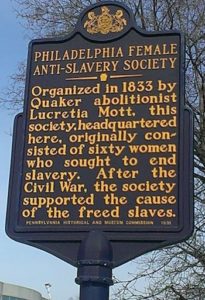
The Philadelphia Female Anti-Slavery Society was founded on this date in 1833. This was an intersectionality-based abolitionist group that also championed racial and sexual equity.
The society's first meeting occurred in Catherine McDermot’s schoolroom in Philadelphia. The constitution they adopted set forth their firm belief that slavery and prejudice were contrary to the laws of God and the Declaration of Independence. During the 1830s, 40s, and 50s, anti-slavery societies sprang up in cities across the North. Nine of the 42 women who became the society’s charter members were Black. They were:
Charlotte Forten and her three daughters, Harriett D. Purvis, Sarah Louise Forten, and Margaretta Forten. Grace Douglass, Mary Woods, Lydia White, Margaret Bowser, and Sarah McCrummel also signed the charter; Sarah Mapps Douglas joined the organization shortly after. Black women shaped many of their philosophies; their activism characterized the organization. In 1837, they joined their white colleagues, Lucretia Mott, and three others, to form a six-member board of managers, raising money and coordinating fairs for emancipation.
For nine years (1840 to 1849), the society’s education committee, which included several Black members, allocated $120 annually to finance a school taught by Sarah Mapps Douglass. The women also worked with Robert Purvis and other Blacks of the Philadelphia Vigilant Committee by donating money to clothe, feed, and transport slaves fleeing the South. With the end of the American Civil War and the ratification of the post-Civil War constitutional amendments, members of the society determined that their work was finished.
Resolutions were offered at the final meeting of the society on March 21, 1870, and the occasion was celebrated. “Whereas,” began the resolution proposed by Margaretta Forten, “the object for which this Association was organized is thus accomplished, therefore resolved, that the Philadelphia Anti-Slavery Society, grateful for the part allotted to it in this great work, rejoicing in the victory which has concluded the long conflict between slavery and freedom in America, does hereby disband.”
For almost four decades, the society has been a model for racial equality and two-way sisterhood, and its members can be pleased that their hard work to achieve Black emancipation has paid off.
The Encyclopedia Britannica, Fifteenth Edition.
Copyright 1996 Encyclopedia Britannica Inc.
ISBN 0-85229-633-0